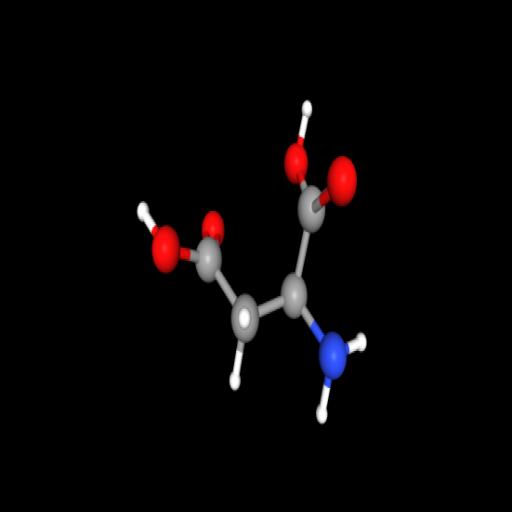Aspartic Acid: Nutrition 101
A Great Friend of Your Metabolism and Mental Clarity

Aspartic Acid
What is Aspartic Acid?
Aspartic Acid is a non-essential amino acid, meaning your body can produce it independently. It plays a critical role in various physiological processes, including protein production, hormone regulation, and detoxification. Aspartic Acid is found in many foods and is integral to several metabolic pathways.
How Does Aspartic Acid Work Inside the Human Body?
Aspartic Acid contributes significantly to energy production by participating in the Krebs cycle, which is essential for converting nutrients into usable energy. Additionally, it helps in the removal of excess ammonia through the urea cycle, which supports nitrogen balance and reduces toxicity. Aspartic Acid is also involved in the synthesis of other amino acids and neurotransmitters, both of which are vital for maintaining brain function and overall cellular health.
What Are the Health and Wellness Benefits of Aspartic Acid?
Aspartic Acid supports several key functions in the body. It aids in energy production, helping to convert nutrients into usable energy, which is crucial for both physical and mental performance. The amino acid also assists in detoxification by aiding in the removal of harmful substances from the body. Additionally, Aspartic Acid plays a role in protein synthesis, which supports muscle recovery and overall growth. It also helps maintain cognitive functions by contributing to neurotransmitter production.
What Happens if Someone is Deficient in Aspartic Acid?
Deficiencies in Aspartic Acid are rare, as the body typically produces adequate amounts. However, extreme conditions such as intense physical stress or prolonged illness might deplete Aspartic Acid levels. Symptoms of a deficiency could include fatigue, diminished cognitive performance, and impaired muscle recovery. Generally, a well-balanced diet provides sufficient Aspartic Acid without the need for supplementation.
How Much Aspartic Acid Should an 80kg Man and a 60kg Woman Consume Per Day?
There is no specific recommended daily intake for Aspartic Acid, as the body can produce it naturally. For an 80kg man and a 60kg woman, meeting Aspartic Acid needs is usually achieved through consuming a diet with adequate protein. The body’s natural production and dietary intake generally cover the required amounts.
What Are the Best Sources of Aspartic Acid?
Aspartic Acid is present in various protein-rich foods. Animal sources include poultry, fish, eggs, and dairy products. Plant-based sources include asparagus, potatoes, legumes such as chickpeas and lentils, nuts, and seeds. Including these foods in your diet will help ensure you receive enough Aspartic Acid.
Parting Words
Aspartic Acid, while not always prominent in discussions, plays an important role in energy production, detoxification, and overall health. By incorporating a variety of protein sources into your diet, you support your body's ability to produce and utilize this essential amino acid, contributing to your overall well-being.
Please like, comment, and share to help spread the word about the free educational resources offered by Epic from Tactical Fitness, Wellness, and Nutrition.
Aspartic Acid is a non-essential amino acid, meaning your body can produce it independently. It plays a critical role in various physiological processes, including protein production, hormone regulation, and detoxification. Aspartic Acid is found in many foods and is integral to several metabolic pathways.
How Does Aspartic Acid Work Inside the Human Body?
Aspartic Acid contributes significantly to energy production by participating in the Krebs cycle, which is essential for converting nutrients into usable energy. Additionally, it helps in the removal of excess ammonia through the urea cycle, which supports nitrogen balance and reduces toxicity. Aspartic Acid is also involved in the synthesis of other amino acids and neurotransmitters, both of which are vital for maintaining brain function and overall cellular health.
What Are the Health and Wellness Benefits of Aspartic Acid?
Aspartic Acid supports several key functions in the body. It aids in energy production, helping to convert nutrients into usable energy, which is crucial for both physical and mental performance. The amino acid also assists in detoxification by aiding in the removal of harmful substances from the body. Additionally, Aspartic Acid plays a role in protein synthesis, which supports muscle recovery and overall growth. It also helps maintain cognitive functions by contributing to neurotransmitter production.
What Happens if Someone is Deficient in Aspartic Acid?
Deficiencies in Aspartic Acid are rare, as the body typically produces adequate amounts. However, extreme conditions such as intense physical stress or prolonged illness might deplete Aspartic Acid levels. Symptoms of a deficiency could include fatigue, diminished cognitive performance, and impaired muscle recovery. Generally, a well-balanced diet provides sufficient Aspartic Acid without the need for supplementation.
How Much Aspartic Acid Should an 80kg Man and a 60kg Woman Consume Per Day?
There is no specific recommended daily intake for Aspartic Acid, as the body can produce it naturally. For an 80kg man and a 60kg woman, meeting Aspartic Acid needs is usually achieved through consuming a diet with adequate protein. The body’s natural production and dietary intake generally cover the required amounts.
What Are the Best Sources of Aspartic Acid?
Aspartic Acid is present in various protein-rich foods. Animal sources include poultry, fish, eggs, and dairy products. Plant-based sources include asparagus, potatoes, legumes such as chickpeas and lentils, nuts, and seeds. Including these foods in your diet will help ensure you receive enough Aspartic Acid.
Parting Words
Aspartic Acid, while not always prominent in discussions, plays an important role in energy production, detoxification, and overall health. By incorporating a variety of protein sources into your diet, you support your body's ability to produce and utilize this essential amino acid, contributing to your overall well-being.
Please like, comment, and share to help spread the word about the free educational resources offered by Epic from Tactical Fitness, Wellness, and Nutrition.
Updated: September 7, 2024 20:48
Category: Science
Keywords: aspartic acid aminos proteins
References
"Aspartic Acid" https://pubchem.ncbi.nlm.nih.gov/compound/Aspartic-Acid
Comments
You must log in to post a comment.